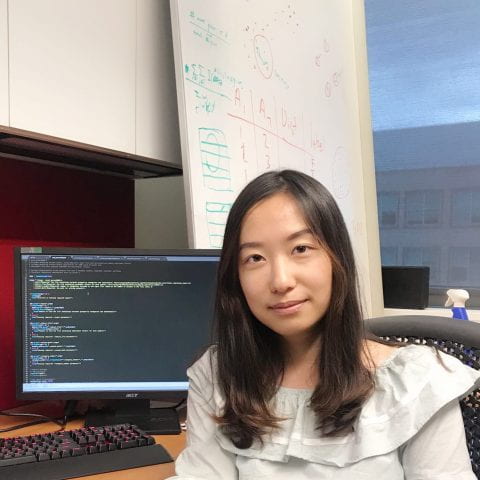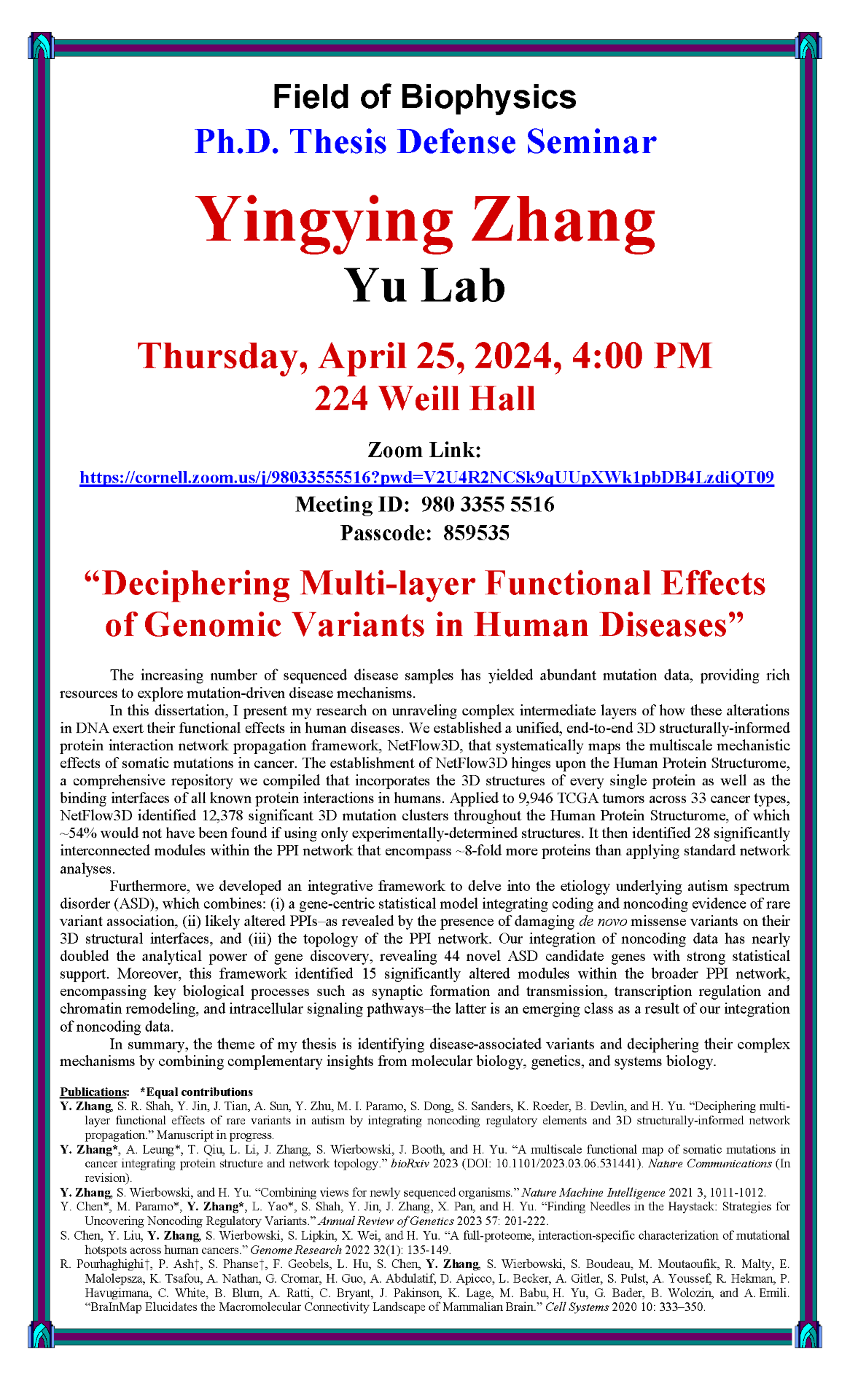Biophysics Ph.D. Thesis Defense Seminar: Yingying Zhang (Yu Lab)

 Field of Biophysics Ph.D. Thesis Defense Seminar: Yingying Zhang, Yu Lab. Thursday, April 25, 2024, 4:00 PM, 224 Weill Hall.
Field of Biophysics Ph.D. Thesis Defense Seminar: Yingying Zhang, Yu Lab. Thursday, April 25, 2024, 4:00 PM, 224 Weill Hall.
“Deciphering Multi-layer Functional Effects of Genomic Variants in Human Diseases”
The increasing number of sequenced disease samples has yielded abundant mutation data, providing rich resources to explore mutation-driven disease mechanisms.
In this dissertation, I present my research on unraveling complex intermediate layers of how these alterations in DNA exert their functional effects in human diseases. We established a unified, end-to-end 3D structurally-informed protein interaction network propagation framework, NetFlow3D, that systematically maps the multiscale mechanistic effects of somatic mutations in cancer. The establishment of NetFlow3D hinges upon the Human Protein Structurome, a comprehensive repository we compiled that incorporates the 3D structures of every single protein as well as the binding interfaces of all known protein interactions in humans. Applied to 9,946 TCGA tumors across 33 cancer types, NetFlow3D identified 12,378 significant 3D mutation clusters throughout the Human Protein Structurome, of which ~54% would not have been found if using only experimentally-determined structures. It then identified 28 significantly interconnected modules within the PPI network that encompass ~8-fold more proteins than applying standard network analyses.
Furthermore, we developed an integrative framework to delve into the etiology underlying autism spectrum disorder (ASD), which combines: (i) a gene-centric statistical model integrating coding and noncoding evidence of rare variant association, (ii) likely altered PPIs–as revealed by the presence of damaging de novo missense variants on their 3D structural interfaces, and (iii) the topology of the PPI network. Our integration of noncoding data has nearly doubled the analytical power of gene discovery, revealing 44 novel ASD candidate genes with strong statistical support. Moreover, this framework identified 15 significantly altered modules within the broader PPI network, encompassing key biological processes such as synaptic formation and transmission, transcription regulation and chromatin remodeling, and intracellular signaling pathways–the latter is an emerging class as a result of our integration of noncoding data.
In summary, the theme of my thesis is identifying disease-associated variants and deciphering their complex mechanisms by combining complementary insights from molecular biology, genetics, and systems biology.
Publications: *Equal contributions
Y. Zhang, S. R. Shah, Y. Jin, J. Tian, A. Sun, Y. Zhu, M. I. Paramo, S. Dong, S. Sanders, K. Roeder, B. Devlin, and H. Yu. “Deciphering multi-layer functional effects of rare variants in autism by integrating noncoding regulatory elements and 3D structurally-informed network propagation.” Manuscript in progress.
Y. Zhang*, A. Leung*, T. Qiu, L. Li, J. Zhang, S. Wierbowski, J. Booth, and H. Yu. “A multiscale functional map of somatic mutations in cancer integrating protein structure and network topology.” bioRxiv 2023 (DOI: 10.1101/2023.03.06.531441). Nature Communications (In revision).
Y. Zhang, S. Wierbowski, and H. Yu. “Combining views for newly sequenced organisms.” Nature Machine Intelligence 2021 3, 1011-1012.
Y. Chen*, M. Paramo*, Y. Zhang*, L. Yao*, S. Shah, Y. Jin, J. Zhang, X. Pan, and H. Yu. “Finding Needles in the Haystack: Strategies for Uncovering Noncoding Regulatory Variants.” Annual Review of Genetics 2023 57: 201-222.
S. Chen, Y. Liu, Y. Zhang, S. Wierbowski, S. Lipkin, X. Wei, and H. Yu. “A full-proteome, interaction-specific characterization of mutational hotspots across human cancers.” Genome Research 2022 32(1): 135-149.
R. Pourhaghighi†, P. Ash†, S. Phanse†, F. Geobels, L. Hu, S. Chen, Y. Zhang, S. Wierbowski, S. Boudeau, M. Moutaoufik, R. Malty, E. Malolepsza, K. Tsafou, A. Nathan, G. Cromar, H. Guo, A. Abdulatif, D. Apicco, L. Becker, A. Gitler, S. Pulst, A. Youssef, R. Hekman, P. Havugimana, C. White, B. Blum, A. Ratti, C. Bryant, J. Pakinson, K. Lage, M. Babu, H. Yu, G. Bader, B. Wolozin, and A. Emili. “BraInMap Elucidates the Macromolecular Connectivity Landscape of Mammalian Brain.” Cell Systems 2020 10: 333–350.


